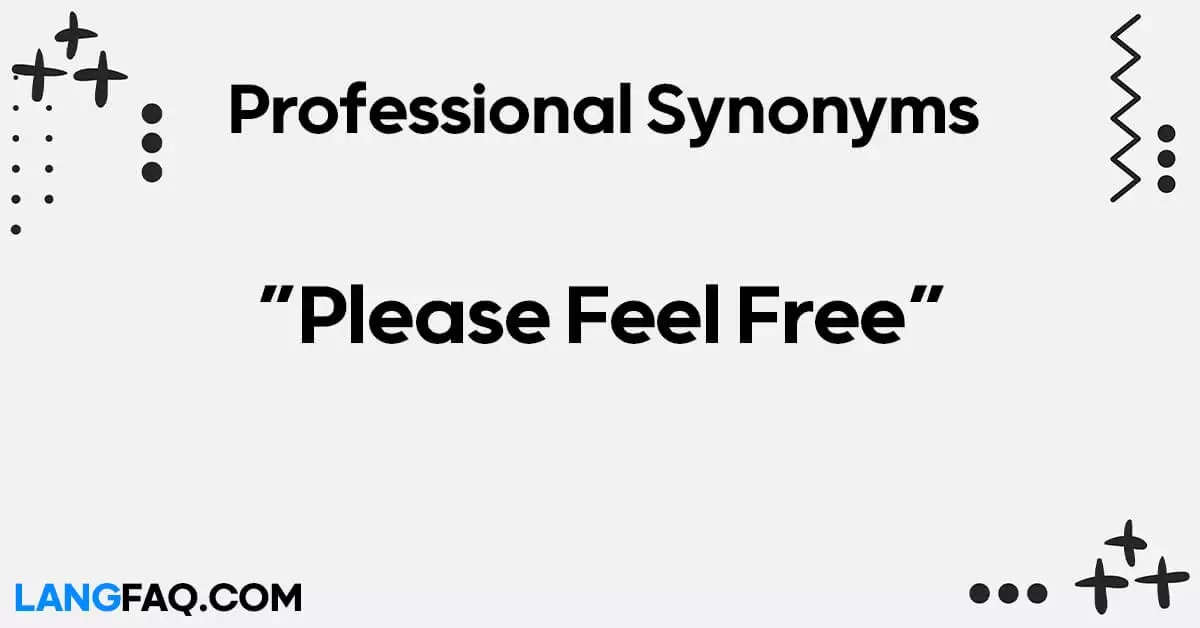In professional settings, it is crucial to maintain a level of politeness and respect in all forms of communication. This not only reflects positively on your character but also helps in building strong relationships with colleagues and clients.
One phrase that is often used to convey politeness is “please feel free.” However, in certain contexts, this phrase can come across as informal or even insincere. As a professional article writer, it is important to be aware of alternative phrases that can effectively convey the same message without compromising on professionalism.
“Please feel free” is commonly used to give someone permission or to make a suggestion without imposing it on them. However, in a professional setting, it can be misinterpreted as a lack of confidence or authority. In such cases, it is better to use more direct and assertive language that also maintains a polite tone.
Here are 12 professional alternatives to “please feel free”:
- “Please do not hesitate to…”
- “I would appreciate your feedback.”
- “I value your input.”
- “I would be grateful if you could…”
- “I would be honored if you could…”
- “I would be delighted if you could…”
- “I would be obliged if you could…”
- “I would be indebted if you could…”
- “I would be thankful if you could…”
- “I would be pleased if you could…”
- “I would be gracious if you could…”
- “I would be obligated if you could…”
These alternatives effectively convey politeness while also maintaining a sense of authority and confidence. As a professional, it is important to choose your words carefully and be mindful of the impact they can have on your communication. By avoiding the use of “please feel free,” you can ensure that your message is received in the intended manner.
Key Takeaways:
Being polite in professional settings is crucial for creating a positive and respectful workplace environment. “Please feel free” can come across as passive and may undermine the importance of the request. There are many professional alternatives to “please feel free” that convey respect and value.
Is It Professional to Say “Please Feel Free”?
In English, it is indeed considered professional to say “Please feel free.” This phrase is often used to invite others to share their thoughts, ask questions, or take action in a courteous and polite manner. It conveys a welcoming and open attitude, making it suitable for various formal and informal situations.
However, to maintain variety and engage your audience effectively, it’s a good practice to incorporate alternative phrases as well. Using a diverse range of expressions, as discussed in the article “12 Professional Ways to Say ‘Please Feel Free’,” can enhance your communication skills and make your interactions more engaging and dynamic while still maintaining professionalism.
Why Is It Important to Be Polite in Professional Settings?
Being polite in professional settings is crucial for several reasons.
First, it creates a positive and respectful work environment, fostering better teamwork and collaboration.
Second, it enhances your professional image and reputation, leading to more opportunities for growth and advancement.
Third, it improves communication and reduces conflicts, ensuring smoother workflow and increased productivity. Lastly, it builds strong professional relationships, fostering trust and loyalty among colleagues and clients. In summary, being polite in professional settings is not only a matter of etiquette but also a strategic approach to success.
In World War I, during the Christmas truce of 1914, British and German soldiers temporarily set aside their differences and came together to celebrate Christmas. They exchanged gifts, sang carols, and played football in a remarkable display of humanity amidst the horrors of war. This heartwarming event demonstrates the importance of politeness and respect, even in the most challenging circumstances. It serves as a reminder of the power of kindness and empathy in all aspects of life, including professional settings.
What Does “Please Feel Free” Mean?
“What Does “Please Feel Free” Mean?” is a polite phrase used to encourage someone to act without hesitation or reservation. It suggests that there are no obligations or restrictions and that the person is welcome to proceed as they see fit. It is often used to grant permission or invite participation in a conversation or activity. This phrase implies that there is no need to seek approval or worry about potential consequences. So, if someone says “please feel free to ask questions,” they are giving you permission to ask any questions you may have without any hesitation.
Why Should You Avoid Using “Please Feel Free”?
There are several reasons why using the phrase “please feel free” should be avoided. Firstly, it can come across as insincere or overly polite, which may not effectively convey your message. Instead, opt for more direct and confident language. Secondly, it can undermine your authority and make you appear unsure of your request. By using stronger and more assertive language, you can convey your message more effectively.
Lastly, it can create ambiguity and confusion. Instead of using “please feel free”, be specific and clear about what you’re asking or offering. This will help avoid any misunderstandings and ensure effective communication.
What Are Some Professional Alternatives to “Please Feel Free”?
In a professional setting, it’s important to communicate effectively and politely. However, constantly using the same phrase, such as “please feel free”, can become repetitive and lose its impact. If you’re looking for professional alternatives to this phrase, you’ve come to the right place.
In this section, we’ll explore 12 different ways to express a similar sentiment, ranging from “please do not hesitate to…” to “I would be obliged if you could…”.
These alternatives will help add variety and sincerity to your communication with colleagues, clients, and partners.
1. “Please Do Not Hesitate to…”
In professional settings, it is crucial to be polite in order to maintain positive relationships and effective communication. Instead of using the phrase “please feel free,” consider using alternatives that convey a similar message while remaining professional. Here are some examples:
- “Please do not hesitate to…” This phrase encourages others to reach out and ask for assistance without any reservations or fear.
- “I would appreciate your feedback.” This conveys a sense of respect and value for the other person’s input.
- “I value your input.” This shows appreciation for the other person’s ideas and opinions.
- “I would be grateful if you could…” This expresses gratitude while making a request.
- “I would be honored if you could…” This acknowledges the importance and significance of the other person’s contribution.
2. “I Would Appreciate Your Feedback”
When seeking feedback in professional settings, using the phrase “I would appreciate your feedback” conveys politeness and professionalism. Here are the steps to effectively use this alternative:
- Begin by expressing gratitude for the recipient’s time and input.
- Clearly state the purpose of seeking feedback and why their perspective is valuable.
- Provide specific areas or questions for feedback, ensuring clarity and relevance.
- Encourage honesty and open communication by assuring the recipient that their feedback will be taken seriously.
- Offer to discuss the feedback further or provide additional information if needed.
By using “I would appreciate your feedback” and following these steps, you can create a respectful and collaborative environment for receiving valuable insights.
3. “I Value Your Input”
Expressing that you value someone’s input in a professional setting is important to foster collaboration and show respect. Here are some steps to effectively communicate this:
- Listen actively: Pay attention to the person speaking and show genuine interest in their ideas.
- Show appreciation: Express gratitude for their input, highlighting specific aspects that you find valuable.
- Encourage further contribution: Invite them to share more ideas or elaborate on their thoughts.
- Consider and incorporate their input: Actively consider their suggestions and integrate them into decision-making processes when appropriate.
- Provide feedback: Offer constructive feedback to further cultivate their contributions.
- Recognize their contributions: Publicly acknowledge and appreciate their input during meetings or through other appropriate channels, showing that you value their input.
4. “I Would Be Grateful If You Could…”
When seeking assistance or feedback in professional settings, it is essential to use polite and professional language. Instead of saying “Please feel free,” you can use the phrase “I would be grateful if you could…” to express your appreciation for their help or input.
This alternative conveys a sense of respect and gratitude, demonstrating that you value their time and assistance.
By utilizing this phrase, you are acknowledging their contribution and expressing your thanks in a professional manner. Using polite language can help cultivate positive relationships and facilitate effective communication in professional contexts.
5. “I Would Be Honored If You Could…”
When communicating in professional settings, it’s important to be polite and respectful. Instead of using the phrase “Please feel free,” consider using alternatives that convey a sense of honor and appreciation.
- “I would be honored if you could…” conveys a deep level of respect and appreciation for the recipient’s contribution.
- “I would be grateful if you could…” shows gratitude for their assistance or input.
- “I would be delighted if you could…” expresses a sense of joy and excitement for their involvement.
Fact: Using polite and professional language fosters positive relationships and enhances effective communication in the workplace.
6. “I Would Be Delighted If You Could…”
When seeking professional alternatives to the phrase “please feel free,” consider using “I would be delighted if you could…”
This phrase conveys politeness and enthusiasm while making a request or seeking assistance. To effectively use this alternative, follow these steps:
- Begin your request with a polite introduction.
- Clearly state what you need or expect.
- Explain the importance or benefit of fulfilling your request.
- Show appreciation and gratitude for their consideration.
- Offer assistance or reciprocation if applicable.
By using this alternative, you can maintain professionalism while expressing genuine enthusiasm and gratitude.
7. “I Would Be Obliged If You Could…”
- “I would be obliged if you could…” is a professional alternative to “please feel free” in professional settings.
- It conveys a sense of gratitude and respect towards the recipient’s assistance or cooperation.
- This phrase can be used when requesting someone’s help, feedback, or input.
- By using this phrase, you acknowledge the recipient’s efforts and show that you value their contribution.
- It helps maintain a polite and courteous tone in professional communication.
- Remember to use this phrase appropriately and sincerely to ensure effective communication.
8. “I Would Be Indebted If You Could…”
Using the phrase “I would be indebted if you could…” in professional settings is a courteous way to request assistance or feedback. This expression conveys appreciation and recognizes the recipient’s effort, acknowledging any potential inconvenience.
It demonstrates respect and gratitude for their time and expertise. Alternative phrases, such as this one, can help cultivate positive and professional relationships.
By using this phrase, you are showcasing your willingness to express gratitude and return any help or support received. It encourages a collaborative and respectful work environment.
9. “I Would Be Thankful If You Could…”
In professional settings, it is important to be polite and considerate in your communication. One professional alternative to saying “please feel free” is to express gratitude with the phrase “I would be thankful if you could.” This conveys your appreciation for the recipient’s assistance or cooperation.
Here are some steps to effectively utilize this phrase:
- Begin your request or inquiry with a polite introduction.
- State the specific action or favor you would like the recipient to consider.
- Express your gratitude by saying “I would be thankful if you could.”
- Provide any additional details or information necessary for the recipient to fulfill your request.
- Conclude your message with a polite closing and include your contact information if needed.
Pro-tip: Remember to maintain a professional and respectful tone throughout your communication, showing appreciation for the recipient’s time and assistance.
10. “I Would Be Pleased If You Could…”
Using “I would be pleased if you could…” is a professional alternative to “please feel free.” Here are steps to effectively use this phrase:
- Express your request politely.
- Provide context for your request.
- Be specific about what you need.
- Explain the impact or importance of their assistance.
- Show gratitude for their consideration.
- Offer assistance in return, if applicable.
- End with a polite closing.
11. “I Would Be Gracious If You Could…”
When communicating in professional settings, it is important to be polite and respectful. Instead of using the phrase “Please feel free,” which can sometimes sound casual or insincere, consider using alternatives that convey a sense of gratitude and appreciation.
One such alternative is “I would be gracious if you could…” This phrase shows respect and acknowledges the recipient’s willingness to help. Other professional alternatives include “Please do not hesitate to…”, “I would appreciate your feedback”, and “I value your input.” By using these alternatives, you can maintain professionalism while still conveying your request or invitation.
12. “I Would Be Obligated If You Could…”
Using the phrase “I would be obligated if you could” in professional settings can convey a sense of formality and respect. It is a polite way to request assistance or feedback from colleagues or clients. Other alternatives to “please feel free” include:
- “please do not hesitate to,”
- “I would appreciate your feedback,”
- “I value your input.”
These phrases maintain a professional tone and demonstrate a willingness to listen and collaborate. Remember, using polite language in professional settings helps foster positive relationships and effective communication.
Frequently Asked Questions
What are some useful phrases for closing an email?
Some useful phrases for closing an email include “Thank you for your time,” “Looking forward to hearing from you,” and “Please feel free to contact me for further queries.”
How can I make a good impression when writing emails?
One way to make a good impression when writing emails is to use professional and polite language. Consider using phrases like “Please feel free” and “I am here to help” to show respect and willingness to assist.
How can I save time when writing emails?
One way to save time when writing emails is to create a “toolbox” of useful phrases that can be reused. This can include expressions for closing emails, thanking recipients, and offering assistance.
What are some ways to say “please feel free” in a more professional manner?
Some professional ways to say “please feel free” include “Please do not hesitate to,” “I would appreciate,” and “Please let me know if you need anything else.”
How can I get someone’s immediate attention in an email?
To get someone’s immediate attention in an email, you can use phrases like “I would greatly appreciate it if you could respond right away” or “Could you kindly give me a few minutes of your time to discuss this?”
Is it acceptable to reuse standard phrases in emails?
Yes, it is acceptable to reuse standard phrases in emails as long as they are appropriate for the tone and purpose of the email. However, it is important to personalize the email and make sure the tone is right.







